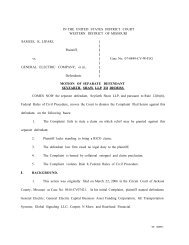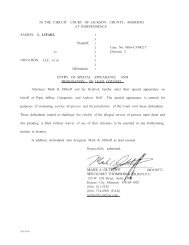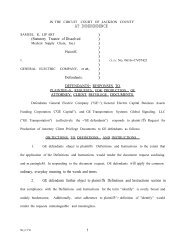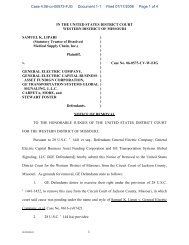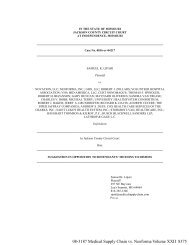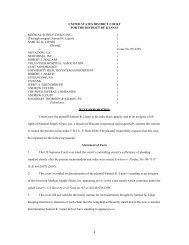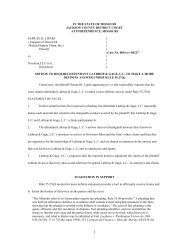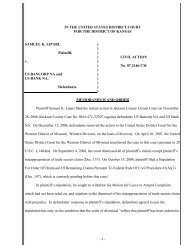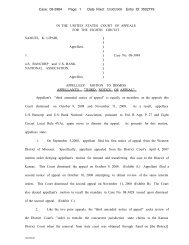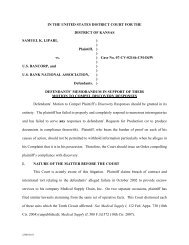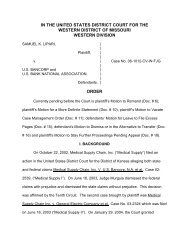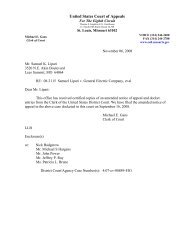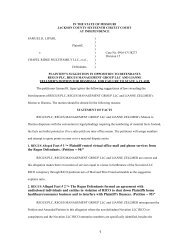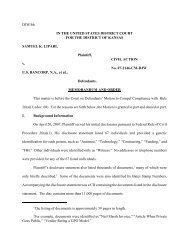Lipari Answer to GE Opposing Dismissal of Affirmative Defenses
Lipari Answer to GE Opposing Dismissal of Affirmative Defenses
Lipari Answer to GE Opposing Dismissal of Affirmative Defenses
- No tags were found...
You also want an ePaper? Increase the reach of your titles
YUMPU automatically turns print PDFs into web optimized ePapers that Google loves.
10. On February 9, 2007, the defendants orally sought anextension without a showing <strong>of</strong> good cause and obtained anextension <strong>of</strong> ten days <strong>to</strong> reply <strong>to</strong> the plaintiff’s motions<strong>to</strong> dismiss the defendants affirmative defenses.11. The defendants failed <strong>to</strong> file a responsive pleadingopposing dismissal <strong>of</strong> their affirmative defenses as <strong>of</strong>February 22, 2007.12. The plaintiff prepared a proposed order striking thedefendants’ affirmative defenses. See Attachment 1.13. On February 23, 2007 the defendants filed theirsuggestion opposing dismissal <strong>of</strong> their affirmativedefenses.14. The defendants’ response does not oppose dismissal <strong>of</strong>the first set <strong>of</strong> affirmative defenses raised in theirmotion <strong>to</strong> dismiss on 5-4-06.15. The defendants’ response falsely asserts on page 3that “there has been no fact discovery regarding the <strong>GE</strong>defendants’ affirmative defenses” when the plaintiff hasproduced thousands <strong>of</strong> documents in discovery <strong>to</strong> thedefendants who have themselves not produced a singledocument.SUG<strong>GE</strong>STION IN SUPPORT OF PROPOSED ORDER DISMISSINGAFFIRMATIVE DEFENSES3
The defendants suggestion in opposition argues thattheir 5-4-06 motion <strong>to</strong> dismiss was not the first responsivepleading <strong>to</strong> the plaintiff’s petition filed 3-22-06. Thedefendants on page 2 <strong>of</strong> their suggestion instead argue thattheir 7-17-06 answer <strong>to</strong> the petition was their firstresponsive pleading <strong>to</strong> the 3-22-06 petition and that theMissouri Supreme Court case Detling v. Edelbrock, 671S.W.2d 265 is not controlling on the issue <strong>of</strong> whether amotion <strong>to</strong> dismiss is counted as a first responsive pleadingfor affirmative defense purposes.The defendants raised two affirmative defenses thatwere defective at law in their motion <strong>to</strong> dismiss. Raisingdefenses in a motion <strong>to</strong> dismiss is proper when that motionis the first responsive pleading:“In that regard, Rule 55.083 requires, inter alia,that "[i]n pleading <strong>to</strong> a preceding pleading, a partyshall set forth all applicable affirmative defenses[.]"Hence, the failure <strong>to</strong> plead the running <strong>of</strong> theapplicable statute <strong>of</strong> limitations as a defense in aresponsive pleading, waives the defense. Patel v. Pate,128 S.W.3d 873, 877 (Mo.App.2004). Here, there is nodispute that the respondents properly pled theaffirmative defense <strong>of</strong> the running <strong>of</strong> the applicablestatute <strong>of</strong> limitations in their answer <strong>to</strong> theappellant's petition.If properly pled, as here, the affirmativedefense <strong>of</strong> the running <strong>of</strong> the statute <strong>of</strong> limitationsmay be asserted in a motion <strong>to</strong> dismiss. Id.”2006).Doyle v. Crane, 200 S.W.3d 581 at 585 (Mo. App.,4



